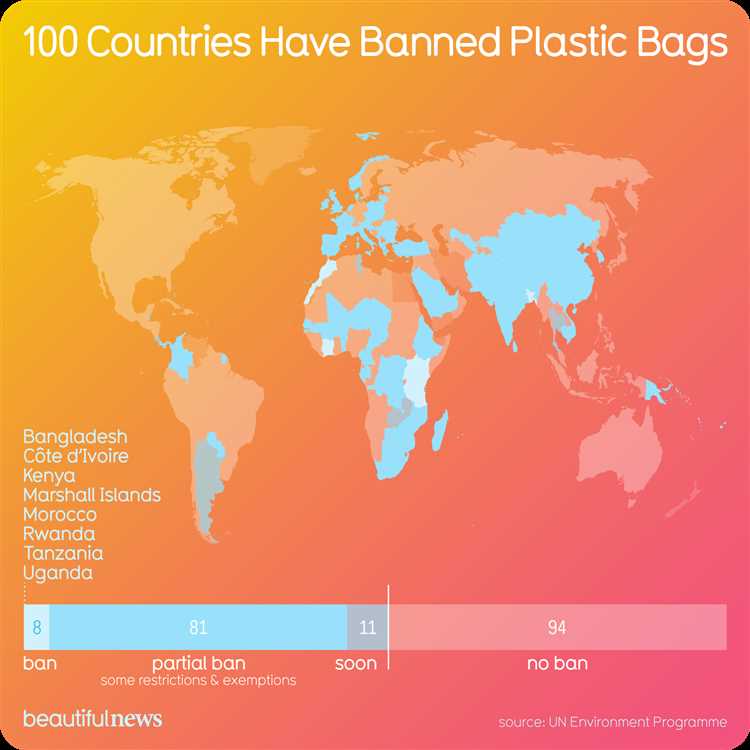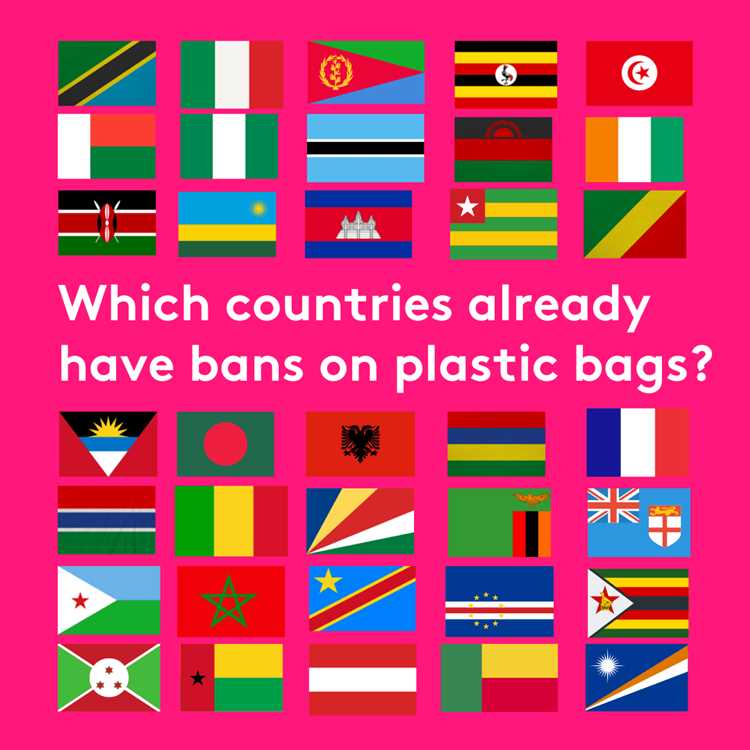Plastic pollution has become a major global environmental concern in recent years. The widespread use of single-use plastics has led to devastating effects on our oceans, wildlife, and ecosystems. To combat this issue, an increasing number of countries have taken the initiative to ban or restrict the use of plastic products.
India is one of the countries at the forefront of the global fight against plastic pollution. In 2016, the Indian government implemented a nationwide ban on plastic bags and single-use plastics in an effort to tackle the growing environmental crisis. The ban prohibits the manufacture, sale, and use of plastic bags and other disposable plastic items, and violators can face hefty fines and even imprisonment.
Kenya is another country that has taken bold steps to address the plastic pollution problem. In 2017, the Kenyan government imposed one of the world’s toughest bans on plastic bags. The ban applies to the production, sale, and use of plastic bags, and anyone found using a plastic bag could face fines or imprisonment. This strict measure has had a significant impact on reducing plastic waste in the country.
Canada has also joined the global fight against plastic by implementing a ban on single-use plastics. In October 2021, the Canadian government announced plans to ban various single-use plastic items, including plastic bags, straws, cutlery, and stir sticks, by the end of 2022. The ban aims to reduce plastic waste and encourage the use of more sustainable alternatives.
These are just a few examples of the many countries that have taken proactive steps to combat plastic pollution. The implementation of such bans is a crucial step towards reducing plastic waste and protecting our planet for future generations.
- Overview of Plastic Bans
- Types of Plastic Bans
- Benefits of Plastic Bans
- Challenges and Progress
- Plastic Bans in European Countries
- France
- Italy
- Germany
- Plastic Bans in Asian Countries
- India
- China
- Japan
- Taiwan
- Plastic Bans in African Countries
- Q&A:
- Which countries have banned plastic?
- What is the reasoning behind banning plastic?
- Has the ban on plastic been successful?
- Are there any exceptions or alternatives to the ban on plastic?
- What are the challenges faced in implementing a plastic ban?
- Which countries have banned plastic?
Overview of Plastic Bans
Plastic pollution has become a major problem worldwide, with plastic waste causing significant harm to the environment and wildlife. In response to this issue, many countries have implemented plastic bans to reduce the consumption and production of single-use plastics. These bans aim to promote sustainable alternatives and reduce the amount of plastic that ends up in landfills and oceans.
Types of Plastic Bans
Plastic bans can take various forms, depending on the specific needs and circumstances of each country. Some bans target specific types of single-use plastics, such as plastic bags or straws, while others have more comprehensive bans that include multiple plastic products. Some countries have also implemented bans on the production and import of certain types of plastic goods.
Benefits of Plastic Bans
The implementation of plastic bans has several benefits for the environment and society as a whole. By reducing the consumption of single-use plastics, these bans help to conserve natural resources and reduce the carbon footprint associated with plastic production. They also contribute to the preservation of ecosystems and protect marine life from the harmful effects of plastic pollution.
- Reduction in plastic waste ending up in landfills and oceans
- Conservation of resources and reduction in greenhouse gas emissions
- Protection of wildlife and ecosystems from plastic pollution
- Promotion of sustainable alternatives and innovation in packaging
- Public awareness and education about the impact of plastic pollution
Challenges and Progress
While plastic bans have proven to be effective in reducing plastic consumption, there are also challenges associated with their implementation. Some of these challenges include resistance from plastic industries, the need for alternatives that are affordable and accessible, and the enforcement of bans. However, many countries have made significant progress in implementing and enforcing plastic bans, and their success serves as an example for others to follow.
Overall, plastic bans are an important step towards addressing the plastic pollution crisis. By reducing the production and consumption of single-use plastics, countries can protect the environment, preserve natural resources, and promote a sustainable future for all.
Plastic Bans in European Countries

In recent years, many European countries have taken significant steps to combat plastic pollution by implementing various plastic ban measures. These measures aim to reduce plastic consumption, promote recycling, and encourage the use of more sustainable alternatives. Here are some of the countries in Europe that have implemented plastic bans:
France
France is known for implementing one of the most comprehensive plastic bans in the world. In 2016, the country became the first nation to ban plastic plates, cups, and cutlery. This ban also includes certain single-use plastic items like straws and stirrers. The law encourages the use of biodegradable products and promotes the concept of a circular economy.
Italy
Italy has adopted several measures to reduce plastic consumption. In 2019, the country introduced a ban on the distribution, sale, and use of single-use plastic bags. Additionally, the production and sale of plastic cotton buds with single-use plastic stems have been prohibited. The Italian government has also implemented a plastic tax to discourage the use of non-recyclable plastics.
Germany
Germany has been at the forefront of recycling and waste management efforts. The country has implemented a ban on certain single-use plastic items, such as cotton buds, cutlery, plates, straws, and stirrers. In addition, Germany has introduced a deposit system for plastic bottles to promote recycling and encourage consumers to return their empty bottles for reuse.
Other European countries implementing plastic bans include the United Kingdom, Ireland, Spain, and the Netherlands. Each country has its own specific measures and timeline for implementing these bans, but the overall goal is to reduce plastic waste and promote a more sustainable future.
Plastic Bans in Asian Countries
Asia, as a region, has been actively implementing plastic bans to address the environmental and health concerns associated with single-use plastic. Several countries in Asia have implemented or proposed measures to restrict or ban the use of plastic.
India
India has been at the forefront of the global fight against plastic pollution. In 2018, the Indian government announced a nationwide ban on single-use plastics, including plastic bags, cutlery, and straws. The ban is aimed at reducing plastic waste and promoting sustainable alternatives. The government has also encouraged the use of biodegradable materials and imposed fines for non-compliance.
China
China, one of the largest producers and consumers of plastic, has taken significant steps to curb plastic pollution. Several cities in China have implemented bans on plastic bags, and the government has set targets to reduce single-use plastic consumption. In 2020, China announced plans to ban non-degradable plastic bags and single-use straws in major cities by the end of 2022. The ban is part of the country’s efforts to build a “Beautiful China” with improved environmental conditions.
Japan
Japan has implemented various measures to reduce plastic waste and promote recycling. In 2020, the government introduced a law requiring retailers to charge customers for plastic bags to discourage their use. Additionally, many cities in Japan have banned or restricted the use of plastic straws and single-use cutlery. The country aims to promote a circular economy and minimize plastic waste through improved waste management systems and public awareness campaigns.
Taiwan

Taiwan has been a leader in plastic waste reduction in Asia. In 2020, the government implemented a ban on single-use plastic items, including plastic bags, straws, and disposable tableware, in restaurants, shopping malls, and other public places. The ban is part of Taiwan’s broader efforts to achieve zero waste and build a sustainable society. The government has also launched campaigns to promote reusable alternatives and recycling.
| Country | Type of Plastic Ban | Year Implemented |
|---|---|---|
| India | Nationwide ban on single-use plastics | 2018 |
| China | Bans on plastic bags and single-use straws | Ongoing |
| Japan | Charging for plastic bags, bans on plastic straws and single-use cutlery | 2020 |
| Taiwan | Ban on single-use plastic items | 2020 |
Plastic Bans in African Countries
African countries have been increasingly implementing plastic bans as a way to address the serious environmental issues caused by plastic pollution. These bans aim to reduce the use of single-use plastics and encourage the adoption of more sustainable alternatives. Here are some African countries that have implemented plastic bans:
- Kenya: In 2017, Kenya implemented one of the world’s toughest plastic bag bans. The ban prohibits the manufacture, importation, and use of plastic bags, with penalties that include fines and imprisonment.
- Rwanda: Rwanda banned the use of single-use plastic bags in 2008. The ban has been quite successful, leading to a significant reduction in plastic bag litter and promoting environmental awareness.
- Tanzania: Tanzania introduced a ban on plastic bags in 2019. The ban prohibits the import, export, manufacture, sale, and use of plastic bags, with penalties that include hefty fines and even imprisonment.
- Cameroon: In 2014, Cameroon banned the production, importation, and use of non-biodegradable plastic bags. The ban aims to encourage the use of biodegradable alternatives and reduce plastic waste.
- Morocco: In 2016, Morocco implemented a ban on the production, importation, sale, and distribution of plastic bags. The ban has led to a significant decrease in plastic bag usage and a rise in the use of reusable bags.
These are just a few examples of African countries that have taken significant steps to combat plastic pollution through the implementation of plastic bans. These actions demonstrate their commitment to environmental sustainability and the protection of their natural resources.
Q&A:
Which countries have banned plastic?
Several countries have implemented measures to ban or restrict the use of plastic. Some of these countries include Kenya, Rwanda, Morocco, Ethiopia, and France.
What is the reasoning behind banning plastic?
The reasoning behind banning plastic is primarily centered around environmental concerns. Plastic pollution has become a global problem, causing harm to marine life and ecosystems. Banning plastic helps reduce waste, promotes alternative eco-friendly materials, and encourages sustainable practices.
Has the ban on plastic been successful?
The success of plastic bans varies among countries. Some countries have seen significant reductions in plastic waste and pollution, while others still face challenges in enforcing the ban and dealing with illegal trade or alternatives to plastic. Overall, the ban on plastic has had a positive impact in raising awareness about environmental issues and encouraging sustainable practices.
Are there any exceptions or alternatives to the ban on plastic?
Yes, many countries allow exceptions to the ban on plastic for certain essential purposes, such as medical and scientific uses. Additionally, governments and businesses are promoting the use of alternative materials, such as biodegradable or compostable plastics, as substitutes for traditional plastic.
What are the challenges faced in implementing a plastic ban?
Implementing a plastic ban can face several challenges. One of the main challenges is changing consumer behavior and habits, as plastic has become deeply ingrained in our daily lives. Additionally, enforcing the ban, dealing with illegal trade and smuggling of plastic, and finding sustainable alternatives can be challenging for governments and businesses. Education and awareness campaigns are crucial in addressing these challenges.
Which countries have banned plastic?
Over 60 countries have implemented some form of plastic ban, including Canada, France, India, Italy, Kenya, Rwanda, and the United Kingdom.